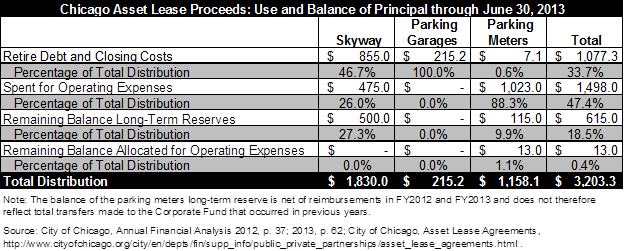September 19, 2013
The long-term lease of assets by the City of Chicago is one of the most significant financial undertakings by the City in recent years. These groundbreaking transactions have received national attention and been examined by other governments interested in new models of public-private partnerships. Recognizing the importance of these actions, the Civic Federation continues to examine these complex transactions and use of the proceeds.
The Civic Federation’s annual budget analysis of the City of Chicago’s proposed budget examines the actual and budgeted expenditures of the Skyway and parking meter asset lease proceeds, the distribution of proceeds to support the Corporate Fund and remaining balances of the reserve funds.
Building on this research, the Civic Federation developed a more comprehensive accounting of all of the asset lease proceeds in this blog in 2011. The examination included not just the Skyway and parking meter proceeds, but also the City’s share of the proceeds from leasing the downtown public parking system. The downtown parking system consists of four underground parking garages. An infrastructure fund established by Morgan Stanley Investment Management received the rights to operate the Parking System for 99 years in exchange for $563 million. Since the Chicago Park District owned three of the downtown parking garages, the District entered into an intergovernmental agreement to transfer its three garages to the City for $347.8 million, leaving the City with approximately $215.2 million in proceeds. For more information on the Park District’s use of the $347.8 million it received for the City’s lease agreement, see the Federation’s analysis of the Park District’s FY2013 proposed budget.
This post examines expenditures and remaining balances together to provide a comprehensive overview of the lease proceeds. For simplicity, we took the original allocation of proceeds minus projected remaining balances to determine the current allocation of proceeds. Additionally, we did not include revenues generated through interest in the analysis. The balance of the parking meters long-term reserve is net of reimbursements in FY2012 and FY2013 and does not therefore reflect total transfers made to the Corporate Fund that occurred in previous years. For example, the balance of the parking meter long-term reserves fell to as low as $80.0 million in FY2011, bringing the total amount of reserves spent for operating expenses to as much as $1.06 billion. However, the City has since replenished the reserve fund to a balance of $115 million.[1]
The chart below outlines the City’s asset lease proceeds. By June 30, 2013, the City will have utilized 72.7% of the Skyway proceeds for operating expenses and debt retirement, leaving a balance of $500.0 million in a long-term reserve. It will also have utilized 88.9% of the parking meter proceeds for operating expenses and debt retirement, leaving a balance of $115.0 million. The FY2013 balance of the parking meter proceeds is slightly better than in FY2011, when the City drained reserves to $80.0 million and had spent approximately 91.4% of proceeds on operating expenses. The City allocated 100% of its parking garage proceeds toward debt retirement and closing costs.
Examining the three transactions together reveals that nearly half (47.4% or $1.5 billion) of all the proceeds have been expended, budgeted or allocated for operating expenses. The next largest category of use is retiring debt and closing costs at 33.7% or nearly $1.1 billion. Only 18.5% or $615.0 million remains in long-term reserves.
With the passage of the FY2012 budget, the City ended the practice of transferring principal from long-term reserves to balance the City’s annual budgetary gap. Mayor Emanuel has directed the City to only transfer interest earned on the long-term reserve funds to the Corporate Fund going forward. The City has additionally started to replenish the funds by depositing $20.0 million into the long-term reserves in FY2012 and an estimated $15.0 million in FY2013.[2]
[1] City of Chicago, Annual Financial Analysis 2013, p. 63
[2] City of Chicago, Annual Financial Analysis 2013, p. 64

